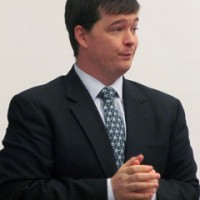More fiscal cliffs await
- Details
- Published on Monday, 07 January 2013 12:54
- Written by Paul Gordon
Chamber of Commerce leadership not optimistic about fiscal integrity at state or federal levels
Leaders from the U.S. and Illinois Chambers of Commerce don't sound very optimistic these days about federal or state fiscal problems getting resolved soon.
Speaking Monday to Peoria Area Chamber of Commerce members during a local panel discussion, those leaders said there are more fiscal cliffs in the offing that Congress and the Illinois General Assembly must come to grips with.
Whether they were talking about the state or federal government, Doug Whitley and Cholly Smith expressed little optimism that the fiscal woes besetting each will be corrected soon.
Whitley, CEO of the Illinois Chamber of Commerce, and Smith, manager of the Great Lakes Region of the U.S. Chamber of Commerce, said Monday there hasn't been enough movement on the fiscal issues to lead them to feel optimistic.
Speaking to a couple dozen members of the Peoria Area Chamber of Commerce during a panel discussion titled "Elections and Fiscal Cliff: Now What?", Whitley and Smith any feelings of relief brought by agreements such as the one that avoided the so-called Fiscal Cliff are tempered by the realization of cliffs still ahead.
"From our perspective, we are happy something got done in Congress last week and we know it could have been a lot worse," Smith said.
However, he added, "There are important issues being held hostage by our fiscal problems. We are preparing for the worst but hoping for the best." That after reminding his audience that the federal debt ceiling will be hit by mid-February and that sequestration — in this case, the automatic start of spending cuts to trim the federal deficit — will kick in March 1 without a fix.
Also, the spending authority that is normally good for a year when a new federal budget is approved expires March 27, six months ahead of the start of the next fiscal year, because of Congressional action just ahead of Fiscal Year 2013, which began Oct. 1, 2012.
Other key federal issues yet to be resolved, Smith said, include tax reform and fixing entitlements, which he said are still heading toward insolvency despite years of chatter about them in Washington.
Smith said there are many issues being thrown into the Congressional mixing pot and that is causing uncertainty. "When you have uncertainty, people are hesitant to invest," he said.
He said non-traditional entities will need to step into the fray to get some issues fixed. Noting corporate tax rates as an example, to get reform accomplished will take "getting corporations and small businesses singing from the same sheet music."
On the state level, Whitley told the audience the issues facing the Illinois General Assembly have changed very little the last two years. Chief among them, he said, is "fiscal integrity," where progress has been so small "it hasn't even moved the needle."
Pensions for public employees remain the key hurdle and Whitley said Gov. Pat Quinn has at least tried to get discussions going toward a resolution. However, he noted, not enough has happened vote in the General Assembly before Wednesday, when the new General Assembly is sworn in. "Then we have to start all over again," he said.
Whitley said he believes every legislator, including the new ones taking office on Wednesday, realizes the importance of pension reform to the state's fiscal well being. "But all we get proposed are incremental changes. We need bold changes," he said.
During a question-and-answer session with the audience, Whitley explained that the pension problem occurred because the state had, for decades, underfunded the employer's portion of the public employee pension plan. "In the private sector you go to jail for that," he noted.
As the Chamber of Commerce — whether at the federal, state or local level — advocates for its business members, Whitley cautioned that the business community is still in the General Assembly's crosshairs when it discusses ways to raise state revenues.
He stopped short of calling on the Illinois General Assembly to make "a bold move" and push toward making Illinois a "right-to-work" state, but Whitley said the fact both Indiana and Michigan have done that has not been lost on Illinois leaders.
Whitley took the Democrat-controlled General Assembly to task when he said spending must be controlled for fiscal reform to happen. "A big issue is whether the Democrats can control spending," he said.
He added he believes Gov. Quinn, also a Democrat, will work to better control spending "because I think he wants to run for re-election. So he will want to show some fiscal discipline."
Quinn's term expires in January 2015, but the governor has not announced his intentions for the 2014 election.
Dale Risinger, a retired Illinois state senator who attended the meeting, noted that Illinois has more people on public aid than it does working. "We have to do something to create stability before we can know what the needs of the state are," he said.
Roberta Parks, president of the Peoria Area Chamber of Commerce, said before the panel discussion that the chamber plans to continue to enhance its government affairs activities. "It is important for the business community to get an in-depth look at what is happening at the state and federal level because it has a significant impact on them," she said.
Paul Gordon is editor of The Peorian. He can be reached at 692-7880 or editor@thepeorian.com



















































